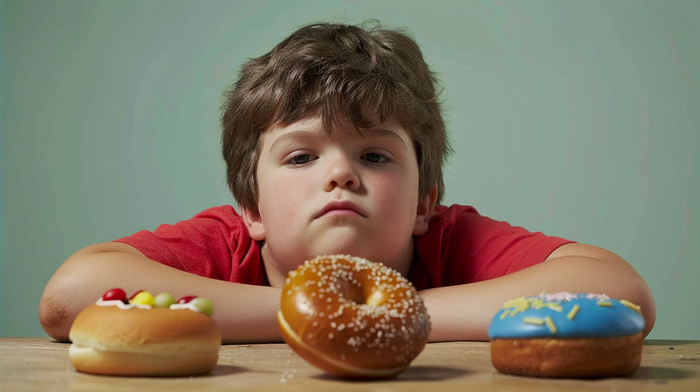Key points
- Childhood obesity is a growing global issue, with serious health risks including chronic diseases and psychological implications.
- The condition is diagnosed by comparing a child's body mass index (BMI) to age and sex averages, with a BMI at or above the 95th percentile considered obese.
- Causes of childhood obesity include unhealthy eating habits, lack of physical activity, genetic predisposition, and environmental influences.
- Prevention strategies involve promoting healthy lifestyle choices, creating supportive environments, and implementing community-wide initiatives.
- Prevention strategies include promoting a balanced diet, regular physical activity, adequate sleep, and creating supportive environments. Parents are encouraged to set a good example and consult a healthcare provider if concerns about a child's weight arise.

Childhood obesity is a pressing public health issue that is on the rise globally. According to the World Health Organization (WHO), the number of overweight or obese children under the age of five is estimated to have increased from 32 million in 1990 to 41 million in 2016.
In the United States, the Centers for Disease Control and Prevention (CDC) reports that the prevalence of obesity among children and adolescents aged 2-19 years was 18.5% in 2015-2016. These statistics underscore the urgency of addressing childhood obesity and its associated health risks. Continue reading to learn more about the risks of childhood obesity, health consequences, and potential solutions to combat this growing epidemic.
What Is Childhood Obesity?
Childhood obesity is a medical condition in which children and adolescents accumulate excess body fat that can negatively impact their health and well-being. It is typically diagnosed by measuring a child's body mass index (BMI) and comparing it to growth charts based on averages for age and sex. Children with a BMI at or above the 95th percentile are considered obese, according to the CDC.
According to the CDC, childhood obesity can lead to a range of health issues, including an increased risk of developing chronic diseases such as:
-
Type 2 diabetes
-
Heart disease
-
High blood pressure
-
High cholesterol
-
Sleep apnea
-
Asthma
-
Certain types of cancer
Additionally, childhood obesity can have psychological and social implications, affecting a child's self-esteem and overall quality of life. Addressing childhood obesity is crucial to promoting the long-term health and well-being of children and preventing the onset of serious health complications later in life.
What Causes Childhood Obesity?
Childhood obesity is a complex issue with multiple contributing factors, according to the CDC. They note that common causes include a combination of:
-
Unhealthy eating patterns
-
Lack of physical activity
-
Genetic predisposition
-
Environmental influences, such as observing poor eating habits from parents
For the most part, children who consume high-calorie, low-nutrient foods and beverages while engaging in sedentary behaviors are at a higher risk of developing childhood obesity, according to Boston Children’s Hospital.
What Are the Symptoms of Childhood Obesity?
Childhood obesity has various physical, emotional, and behavioral symptoms. The most noticeable symptoms include:
-
Rapid weight gain or rapidly growing out of clothes
-
Having a higher-than-average body mass index (BMI)
-
Showing early signs of puberty
-
Having a lack of self-control when it comes to eating, especially with "junk" foods
-
Preference for sweets and “junk” food over healthier options
Emotionally, children with obesity may struggle with poor self-esteem, negative body image, and feelings of isolation or depression, according to Boston Children’s Hospital. They also note that behavioral symptoms can include a lack of interest in physical activities, unhealthy eating habits, and social withdrawal.
It's important to note that not all children with obesity will display the same symptoms, and the presence of these symptoms does not necessarily indicate childhood obesity. However, recognizing these potential signs can be an important step in addressing and managing childhood obesity.
How to Prevent Childhood Obesity?
Preventing childhood obesity involves a combination of healthy lifestyle choices, supportive environments, and community-wide initiatives, according to the WHO. Encouraging a balanced diet rich in fruits, vegetables, whole grains, and lean proteins, while minimizing the consumption of sugary drinks and high-calorie, low-nutrient foods, is essential. Regular physical activity is also crucial. According to the CDC, children should aim for at least 60 minutes of moderate to vigorous exercise each day to maintain a healthy weight. Additionally, limiting screen time and promoting adequate sleep are important factors in preventing childhood obesity and maintaining a healthy weight.
For parents, it is possible to make significant strides in preventing childhood obesity and promoting the overall well-being of children. The CDC recommends:
-
Setting a good example by eating healthy and prioritizing exercise in your daily routine, and if you are overweight, prioritize getting your body mass index (BMI) into a healthy range
-
Have healthy snacks available
-
Offer new foods multiple times and in different ways
-
Choose nonfood rewards
-
Be sure your child gets enough sleep which is important for helping your child maintain a healthy weight
When Should My Child See a Healthcare Provider?
It is important for parents to be proactive about their child's health and well-being, including monitoring their weight and overall growth. If you have concerns about your child's weight, seeking guidance from a healthcare provider can help. In general, it is recommended to consult a healthcare provider if you notice significant changes in your child's weight or growth trajectory, or if you have specific concerns about their eating habits, physical activity levels, or overall well-being.
Additionally, if your child is exhibiting symptoms such as persistent weight gain, unusual weight loss, or signs of disordered eating, it is important to seek medical attention as soon as possible. A healthcare provider can conduct a comprehensive assessment, including evaluating your child's growth patterns, nutritional intake, physical activity levels, and overall health to determine if any underlying issues need to be addressed.
Ideally, your child should attend well-child checkups at a clinic that specializes in pediatrics. This is where a pediatrician can monitor their growth chart and body mass index (BMI). Your child's pediatrician can also help with recommendations for preventing obesity and being overweight — including recommendations for physical activity.
Pediatric Urgent Care Near Me
If you have immediate concerns about your child's health related to their weight, such as symptoms of an underlying health condition, you can take your child to see a pediatric doctor at a pediatric urgent care clinic.
How to Help My Child with Obesity
The Cleveland Clinic recommends that you focus on your child's health and not their weight. Offer emotional support and encourage healthy habits like eating a balanced diet, staying active, getting good rest, and most of all leading your child by example. You can also encourage more physical movement by reducing screen time, planning family activities, developing good sleeping habits, cooking healthy recipes together, and trying new (healthy) foods in a variety of ways.
Additionally, you can involve your child with things like grocery shopping and cooking to help them feel more involved in their choices and health. Encourage your child to eat slower and eat meals as a family as much as possible. Avoid eating or snacking in front of a television or video games where it is easy to lose track of how much you've eaten. Instead, stick to a rule that meals and snacks must be eaten in the kitchen.
Fast food is okay in moderation, but too much of it can lead to weight gain and obesity. Try to limit the amount of fast food you and your child consume. When you do need to get fast food, opt for healthier choices like grilled chicken and salad sides. You should also be mindful of the amount of calories in soda and fruit juices — these can cause weight gain due to sugar content.
FAQs
What is childhood obesity?
Childhood obesity is a medical condition where children accumulate excess body fat, negatively affecting their health. It's diagnosed by comparing a child's BMI to age and sex averages.
What are the health risks associated with childhood obesity?
Childhood obesity can lead to chronic diseases like type 2 diabetes, heart disease, high blood pressure, and certain types of cancer. It can also have psychological and social impacts.
What are the main causes of childhood obesity?
The main causes include unhealthy eating patterns, lack of physical activity, genetic predisposition, and environmental influences such as observing poor eating habits from parents.
How can childhood obesity be prevented?
Prevention involves promoting healthy lifestyle choices like a balanced diet and regular physical activity, creating supportive environments, and implementing community-wide initiatives.
When should a child with obesity symptoms see a healthcare provider?
Parents should consult a healthcare provider if they notice significant changes in their child's weight or growth, or have specific concerns about their eating habits, physical activity levels, or overall well-being.









